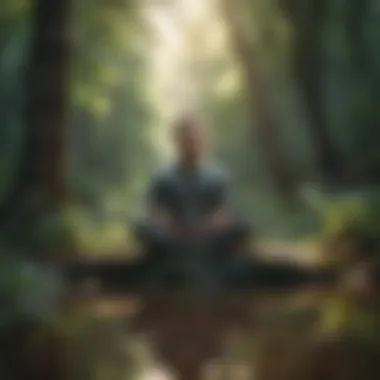Mastering the Art of Quieting Restlessness: Effective Strategies Revealed


Understanding Resilience, Well-Being, and Adaptability
As we delve into the intricate realm of personal development, it becomes imperative to comprehend the profound concepts of resilience, well-being, and adaptability. These pillars serve as the bedrock for an individual's capacity to navigate life's challenges with grace and efficacy. Resilience, the ability to bounce back from adversity, alongside well-being, the state of optimal mental and physical health, and adaptability, the skill to adjust to changing circumstances, are fundamental to fostering a fulfilling existence. In both personal and organizational realms, these factors play a pivotal role in shaping outcomes and fostering growth. Strategies aimed at nurturing resilience and well-being contribute significantly to enhancing one's overall quality of life, enabling individuals to thrive in the face of adversity.
Integration of AI Technology in Coaching
The landscape of coaching is being revolutionized by the integration of Artificial Intelligence (AI) technology. AI-driven coaching solutions are redefining the traditional paradigms of personal development, offering unparalleled insights and guidance to individuals and organizations alike. Through sophisticated algorithms and data analytics, AI technology facilitates personalized coaching experiences, tailoring strategies to meet individual needs effectively. The benefits of AI-driven coaching solutions are multifaceted, ranging from enhanced efficiency and accuracy to the ability to process vast amounts of data in real-time. Case studies showcasing the successful implementation of AI technology in coaching underscore its transformative impact, demonstrating how AI can revolutionize the field of personal development.
Leveraging Behavioral Science for Personal Growth
Behavioral science serves as a powerful tool in the arsenal of personal development. By understanding key principles of human behavior and decision-making, individuals can unlock new avenues for growth and self-improvement. Practical applications of behavioral science in personal development encompass a wide array of techniques geared towards enhancing overall well-being and productivity. By leveraging insights from behavioral science, individuals can cultivate habits that foster resilience, adaptability, and success in various facets of life. Techniques rooted in behavioral science offer a nuanced approach to personal growth, providing valuable strategies for individuals seeking to optimize their potential.
Interactive Tools for Self-Improvement
In the digital age, interactive tools have emerged as indispensable resources for individuals embarking on a journey of self-improvement. These tools, available on various platforms, offer a dynamic and engaging way to enhance resilience, adaptability, and well-being. By effectively utilizing interactive tools, individuals can track their progress, set goals, and access valuable resources to support their personal development endeavors. User testimonials affirm the effectiveness of interactive tools in driving positive change, underscoring their significance in facilitating growth and transformation. The interactive nature of these tools fosters a sense of accountability and motivation, empowering individuals to take charge of their personal development journey.
Understanding Restlessness
Restlessness is a complex and often misunderstood phenomenon that can significantly impact one's daily life and well-being. The ability to properly grasp the underlying causes and implications of restlessness is a crucial aspect of personal development and overall health. By exploring the various facets of restlessness, individuals can gain a deeper understanding of their own mental and emotional states, leading to more effective strategies for managing and overcoming this common issue.


Defining Restlessness
Defining restlessness involves identifying the state of inner turmoil and unease that individuals experience. It goes beyond mere physical agitation to encompass a sense of persistent mental disquiet that disrupts peace and concentration. Understanding the nuances of restlessness allows individuals to differentiate it from other emotional states such as anxiety or boredom, enabling targeted interventions to address the root causes of this restless behavior.
Causes of Restlessness
Restlessness can stem from a multitude of factors, both internal and external. Internal factors may include unresolved emotions, excessive stress, or unmet psychological needs, while external factors could range from chaotic environments to relationship issues. It is crucial to recognize the diverse triggers of restlessness to effectively tackle its underlying origins and implement appropriate coping mechanisms for sustainable relief.
Effects of Restlessness
The effects of restlessness extend far beyond mere feelings of discomfort. Chronic restlessness can lead to heightened levels of anxiety, decreased mental clarity, and disrupted sleep patterns. Moreover, it can hinder productivity, strain relationships, and negatively impact overall quality of life. By understanding the profound effects of restlessness, individuals can appreciate the urgency of addressing this issue and seek proactive measures to regain a sense of calm and equilibrium in their daily experiences.
Mindfulness Practices
Mindfulness practices play a fundamental role in the context of overcoming restlessness. The essence of mindfulness lies in cultivating a heightened awareness of the present moment without judgment. In this article, mindfulness practices are elucidated as instrumental tools for individuals grappling with restlessness, offering a pathway to inner peace and mental tranquility. By incorporating mindfulness into daily routines, individuals can develop a profound sense of self-awareness and emotional regulation, thereby mitigating the effects of restlessness on their overall well-being.
Meditation Techniques
Meditation serves as a cornerstone of mindfulness practices, encompassing various techniques tailored to address specific aspects of the human experience. Within the realm of meditation techniques, individuals can explore diverse modalities such as breath awareness, body scan, and walking meditation, each contributing uniquely to the overarching goal of cultivating mindfulness.
Breath Awareness


Breath awareness stands out as a foundational practice within the domain of meditation, emphasizing the rhythmic inhalation and exhalation of breath as a focal point for concentration. This technique enhances one's ability to anchor themselves in the present moment, fostering a deep sense of tranquility and inner poise. The simplicity and accessibility of breath awareness make it a preferred choice for individuals seeking to combat restlessness, as it offers a direct pathway to calming the restless mind and connecting with the essence of being.
Body Scan
Conversely, the body scan technique involves a systematic exploration of bodily sensations, encouraging practitioners to observe and release tension stored in different parts of the body. By honing attention on bodily cues and sensations, individuals can unravel the physical manifestations of restlessness, promoting a greater sense of relaxation and somatic awareness. The body scan technique serves as a valuable tool for individuals seeking holistic restoration and rejuvenation amidst the tumultuous currents of restlessness.
Walking Meditation
Walking meditation presents a dynamic approach to mindfulness, integrating meditative practice with physical movement. By synchronizing steps with breath and attentiveness, individuals engage in a rhythmic exploration of mind-body connection while immersing themselves in the sensory experience of walking. The meditative quality of walking imbues the practice with a sense of groundedness and vitality, making it an enriching choice for individuals navigating restlessness seeking to reestablish harmony within themselves.
Staying Present
Staying present emerges as a crucial component of mindfulness practices, underscoring the importance of continuous awareness and presence in the unfolding of daily experiences. It entails cultivating a nonjudgmental and attentive state of mind, wherein individuals engage fully with the present moment, free from the distractions of past regrets or future anxieties. By anchoring oneself in the present, individuals foster a deep sense of contentment and clarity, empowering them to confront restlessness with equanimity and resilience.
Lifestyle Adjustments
In the realm of combating restlessness, lifestyle adjustments play a pivotal role. They serve as the fundamental building blocks for fostering a sense of balance and tranquility within one's daily existence. By focusing on specific elements such as diet, exercise, and quality sleep, individuals can pave the way towards a more harmonious and grounded life. Embracing lifestyle adjustments not only addresses the symptoms of restlessness but also serves as a proactive approach towards enhancing overall well-being. Consequently, the significance of incorporating lifestyle adjustments in this context cannot be overstated.
Balanced Diet
A balanced diet forms the cornerstone of optimal health and well-being. When it comes to combating restlessness, dietary choices play a crucial role in regulating mood, energy levels, and cognitive function. Ensuring a diet rich in essential nutrients, vitamins, and minerals can help stabilize blood sugar levels and promote overall mental and physical health. Emphasizing the consumption of whole foods such as fruits, vegetables, lean proteins, and healthy fats can have a profound impact on combating restlessness and promoting a sense of vitality.


Regular Exercise
Engaging in regular physical exercise is not only beneficial for physical health but also plays a crucial role in managing restlessness. Exercise acts as a natural mood enhancer by promoting the release of endorphins, also known as 'feel-good' hormones, in the body. Incorporating activities such as aerobic exercises, strength training, or yoga can help reduce feelings of restlessness and boost mental clarity. Additionally, exercise serves as a productive way to channel excess energy and tension, fostering a sense of relaxation and equilibrium.
Quality Sleep
Quality sleep is a non-negotiable component when it comes to overcoming restlessness. A good night's sleep is essential for cognitive function, emotional regulation, and overall well-being. Establishing a consistent sleep routine, creating a relaxing sleep environment, and practicing good sleep hygiene habits can significantly improve the quality of rest. Adequate rest allows the body and mind to recharge, repair, and rejuvenate - essential prerequisites for combating restlessness and promoting a sense of calmness and focus in daily life.
Seeking Support and Guidance
In the realm of overcoming restlessness, seeking support and guidance stands as a pivotal aspect to consider. When delving into the complexities of restlessness, it becomes evident that navigating this internal tumult alone may prove challenging. Seeking support and guidance offers individuals a pathway towards understanding and managing their restlessness with the assistance of professionals trained in addressing such concerns.
The journey towards overcoming restlessness often entails exploring underlying factors contributing to this state of being. Therapy and counseling serve as potent tools in this regard. Through therapy sessions, individuals have the opportunity to unravel the intricate layers of their emotions, thoughts, and behaviors that may be fueling their restlessness. Therapists provide a safe and non-judgmental space for individuals to delve deep into their psyche, gaining insights and coping mechanisms to navigate their restlessness effectively.
Transitioning from therapy to coaching services presents individuals with a unique approach to overcoming restlessness. Unlike therapy that often focuses on delving into past experiences and emotions, coaching services are future-oriented, aiming to propel individuals towards their goals and desired outcomes. Coaches work collaboratively with individuals, drawing out their strengths, addressing obstacles, and fostering personal growth. Through structured sessions and actionable strategies, coaching services empower individuals to cultivate resilience, enhance self-awareness, and develop practical skills to combat restlessness and optimize their well-being.
Creating a Calming Environment
Creating a calming environment is crucial in the journey to overcome restlessness. By curating a space that promotes tranquility and peace, individuals can better manage stress and anxiety. The environment we are in plays a significant role in our mental well-being. A clutter-free and serene space can help to declutter the mind and provide a sense of calm amidst chaos. Moreover, a calming environment enhances focus, productivity, and overall quality of life.
Decluttering Spaces
Decluttering spaces is a fundamental aspect of creating a calming environment. Chaos in our physical surroundings often reflects inner turmoil and can contribute to feelings of restlessness. By organizing and decluttering living and working spaces, individuals can experience a profound sense of relief and clarity. Clearing out unnecessary items, organizing belongings, and creating functional spaces can promote a sense of control and peace. A tidy environment fosters a peaceful mind and allows individuals to concentrate better on tasks at hand, alleviating restlessness and enhancing overall well-being.
Nature Therapy
Nature therapy is a powerful tool in creating a calming environment. Connecting with nature has been shown to reduce stress levels, promote relaxation, and improve mental clarity. Incorporating natural elements such as plants, natural light, and earthy colors into living and working spaces can have a profound impact on mental health. Spending time outdoors, whether in a park, garden, or natural setting, can help individuals reset their minds, gain perspective, and find inner peace. Nature therapy offers a sanctuary away from the hustle and bustle of daily life, allowing individuals to recharge and rejuvenate amidst the serenity of the natural world.



